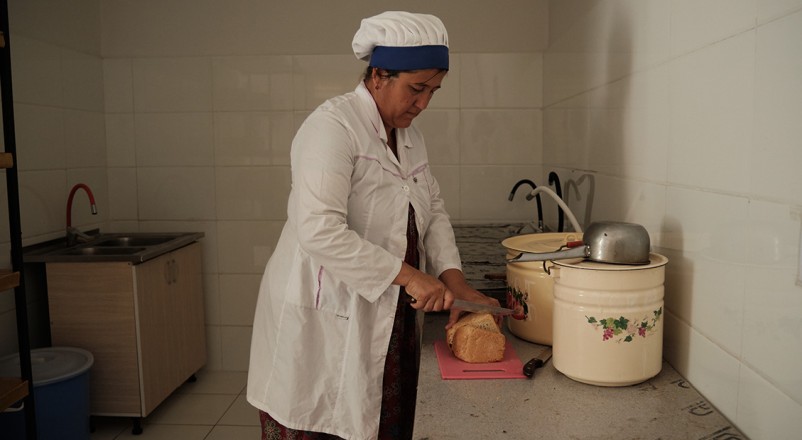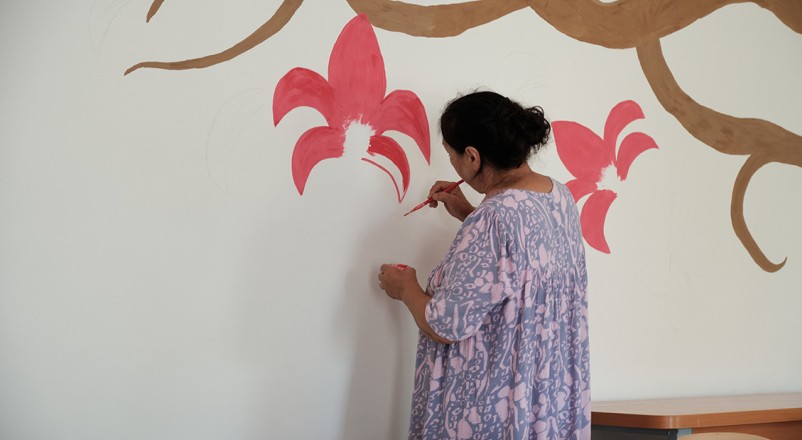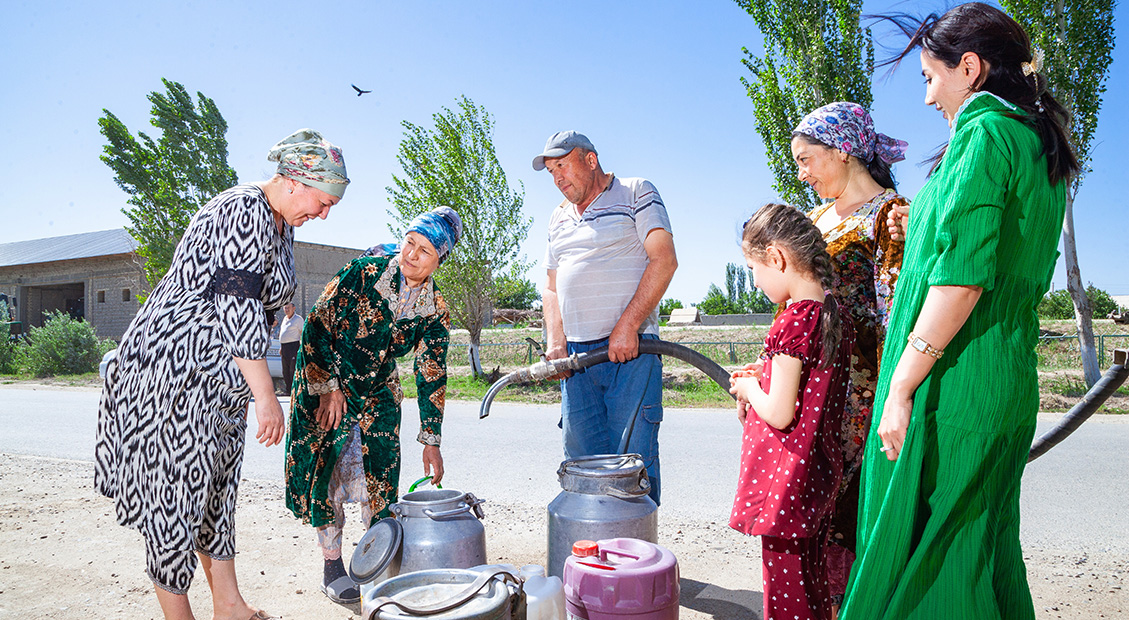The unequal impact of climate change on women and the importance of gender-responsive climate finance is widely acknowledged. Considering the key role of women and girls in climate solutions - and as part of its call for inclusivity - the COP28 presidency has emphasized a gender-just transition, and one that builds upon better quality, gender-disaggregated data and scales up gender responsive finance for women-led climate action.
While general statements about women’s and men’s experiences can cause problems, both when reasoning from experience in different regions and countries, and also when discussing genders as a ‘group’, women’s heterogeneous experiences of climate change can have a lot in common, underpinned by more-or-less restrictive gender norms and secondary socio-economic status.
Women in developing countries face the greatest challenges. Limited access to land and key assets, education, health, clean water, jobs, and political representation, and women’s relative time poverty compared to men, intersect with and exacerbate the negative impacts of climate change in ways which make poor women’s lives even harder.
Central to effective climate action will be the ability of actors to understand and address the negative consequences of climate change on women, while also ensuring they leverage women’s strengths and insights to manage adaptation and mitigation.
The Asian Infrastructure Investment Bank’s (AIIB’s) mission to finance Infrastructure for Tomorrow (i4t) can help to drive a much-needed win-win that advances both climate action and gender equality.
AIIB’s Environment and Social Framework adopts a fully integrated approach to preventing harmful gender impacts and strengthening benefits for women via specific project requirements relating to gender equality, empowerment of women and vulnerable populations, equity of opportunity and non-discrimination.
Our recently launched Climate Action Plan emphasizes the unique vulnerabilities women face amidst the climate crisis, and also focuses attention on women’s key contributions to effective adaptation. Its principle-based action area on impact and holistic approach to co-benefits maximizes inclusivity and gender impacts.
The Bank’s Policy and Strategy commitments are operationalized by investments that specifically take into account gender considerations in two ways, by:
(i) Recognizing the specific vulnerabilities that women face as a consequence of climate change.
(ii) Including corresponding measures that advance gender equality and women’s empowerment.
For example,
- Women are primarily responsible for the collection of the materials necessary for drinking, sanitation, heating, and cooking. Climate change makes this harder. AIIB is investing in water projects which free up women’s time and increase their labor force participation.
Women typically shoulder different existing responsibilities than men, especially where there is inadequate water and energy infrastructure. Drought and flooding increase the distance women need to cover to collect water. Unsustainable agricultural practices induced by land degradation reduce the availability of firewood. Time spent on these home production tasks is already a major contributor to women’s widespread time poverty, and climate change will make things worse. According to UNICEF women and girls worldwide already spend 200 million hours every day collecting water.[1]
Women also possess unique ecological knowledge. Often rooted in gendered norms and practices such as collecting water for irrigation and the seeding and planting of vegetation, women’s practical experiences can inform sustainable resource management and contribute to biodiversity conservation. Women’s potential to meaningfully impact climate change policy may therefore yet be fully recognized and represented.
In response, AIIB’s Uzbekistan Bukhara Region Water Supply and Sewerage Project was designed in ways which free up women’s time and increase participation of women in the labor force. Separate Gender Action Plans are being developed for sub-projects in Bukhara, Rometan, Peshku, Jandor, Kagan, and Karaulbazar districts, as well as the Bukhara and Kagan cities and Karakul, following AIIB commitment to ensure each subproject has a major impact on women’s access to resources, their ability to be economically active, and can enhance their livelihoods and their well-being.

The project Gender Action Plans will focus on key areas such as agency staffing, capacity building, and improved access to household water supply infrastructure. The subprojects will: (i) support the Uzsuvtaminot JSC, Bukhara water utility, and local administrations at the district and community levels to promote women through equal access to training and capacity building; (ii) increase women’s safety and privacy needs through access to separate bathrooms and toilets; (iii) ensure affordable access to water services; (iv) increase employment opportunities and careers for women through access to formal education qualifications; and (v) provide employment for women in subproject works.
- Women often lack decision-making power about infrastructure projects, and thus to influence or implement climate change adaptations. AIIB has been making efforts to ensuring its projects strengthen women’s voice and participation in community-level decision making.
Women’s weak legal status in many developing countries combined with gendered norms about public participation mean that the needs and voices of women can be absent from decision-making processes about essential infrastructure. UNFCCC (2023) research shows that the gender gap also appears in decision-making spaces relevant to climate change adaptation, which hinders gender-responsive climate action by failing to integrate women’s perspectives on their own needs and assets.[2] The absence of women’s voices in infrastructure and climate decision-making is doubly negative given that women are more inclined than men to adopt practices that can help in mitigating and adapting to climate change.[3] Emerging evidence suggests that increasing the representation of women in decision making authorities leads to the enactment of more stringent climate policies.[4]
Recognizing the need to strengthen women’s roles in decision-making as well as the additional climate focus women’s voices can bring, AIIB’s co-investment with the World Bank into Rural Infrastructure Development Project (RIDP) in Uzbekistan includes specific measures to strengthen women’s voice and participation in community-level decision making. Women are underrepresented in Mahalla Citizen Assembly (MCA) chair positions and district and regional administrative offices. To address this gap, the Project has established 50% targets for women’s representation in MCA project committees, Drinking Water Organizations, and social accountability roles, i.e., monitoring and oversight.

Thus far 3,550 women have been mobilized as MDU members and trained in leadership skills, such as how to conduct meetings, how to communicate information, how to facilitate group decision-making, and so on.
The facilitators also lead participatory well-being analysis in each participating village through which community members develop their own criteria for classifying households within four levels of socio-economic well-being. This exercise ensures that women from households categorized as poor or in-need are represented in project decision-making.
- Women often have limited access to finance and financial services and this makes them more vulnerable and less able to cope with the impact of climate change. AIIB is investing in a Fund with gender and sustainability performance targets.
Limited access to finance and financial services significantly heightens women's vulnerability to climate change impacts by hampering their ability to adapt and cope effectively. This issue stems from various factors, including unequal economic opportunities, restricted asset ownership, informal employment, and gender biases within the financial system. Without access to savings, credit, insurance, and other essential financial tools, women find it challenging to invest in climate-resilient strategies, recover from climate-induced losses, or secure their livelihoods in the face of environmental challenges. Addressing these disparities in financial access is not only a matter of gender equality but also a critical component of building resilient communities capable of withstanding the growing threats of climate change.[5]
In response, AIIB has partnered with the Southeast Asia Women’s Economic Empowerment Fund (SWEEF) to finance small and medium-sized enterprises (SMEs) in Southeast Asia. SWEEF is a closed-end private equity fund specialized in financing women’s economic empowerment by investing equity and quasi-equity capital into growth-stage businesses. By partnering with SWEEF, AIIB commits to closing the gender gap, enhancing gender equality and maximizing the beneficial impact of its investments. To strengthen the investment’s contribution to gender equality, diversity, and climate finance, AIIB has designed a sustainability-linked performance scheme where the fund manager's compensation is linked to three sustainability performance targets, namely (1) women-owned/led businesses, (2) demonstrated gender improvements over time and (3) climate disclosure.
- Women can face access and use barriers to information and communications technology (ICT). Women thus face greater barriers to accessing climate change information and training. AIIB is investing to improve cost-effective connectivity.
Gender norms can inhibit women’s participation in training sessions in preparation for climate change. In certain cases, men have been documented to actively prevent women from attending such sessions in fear of their social dominance.[6] ICTs are now key to the transmission and receipt of climate-related information, from weather events to inform agricultural decisions to disaster warning. Access to ICT infrastructure is already documented to be a pathway to women entrepreneurship and empowerment. It may further hold the promise to assist women against climate change.
In response, the Bank’s approach to digital infrastructure emphasizes the need to invest in ways which addresses inequalities according to gender, geographic location (urban vs rural), income levels and physical ability through positive inclusion impacts. In Indonesia, AIIB is providing up to USD150 million project financing to provide fast internet access to remote areas via construction, launch and operation of a 150 Gigabyte-per-second (Gbps) High Throughput Satellite (HTS). The Indonesia Multifunctional Satellite PPP Project will support the Government of Indonesia’s goal to provide connectivity to more than 149,000 Public Service Points in Indonesia, with 23 million female beneficiaries to be connected by this project. Additionally, the project will enable 93,900 schools to receive online education resources and 3,700 health centers to receive improved connectivity, which will have disproportionately positive impacts on women.

Conclusion
Women, particularly those in vulnerable communities, face a multitude of adversities exacerbated by entrenched gender norms and socio-economic inequalities. As climate change alters the natural environment, women face increased difficulty fulfilling common gendered responsibilities and have fewer adaptation options.
Yet, this narrative is far from one of despair.
Investment in gender-inclusive infrastructure can dramatically improve women’s livelihoods. Women are also emerging as crucial drivers of climate action, leveraging their insights and agency to create positive change.
AIIB experience demonstrates there are various ways that development finance institutions can enable women to play a more active role in climate action. This can be by actively engaging women in the design and operation of climate-resilient infrastructure and developing and deploying women-friendly finance services products.[7]
At COP28, AIIB is bringing three themes of focus for action that would help advance our efforts on maximizing co-benefits including on gender. One is strengthening partnerships through engagement of the public and private sector to mobilize climate finance and support country led efforts. Second is delivering on holistic approaches on mitigation, adaptation and biodiversity and nature and maximizing co-benefits such on gender. And third is boosting tailored innovation on financing instruments and promoting the development and adoption of technologies for climate. Please join us at the AIIB Pavilion to find out more.
[1] UNICEF: Collecting water is often a colossal waste of time for women and girls. [Available at: UNICEF: Collecting water is often a colossal waste of time for women and girls]
[2] Progress, good practices and lessons learned in prioritizing and incorporating gender-responsive adaptive action. [Available at: UNFCC. 2023. Progress, good practices and lessons learned in prioritizing and incorporating gender-responsive adaptive action. 202310_adaptation_gender.pdf (unfccc.int)]
[3] Why Climate Action Needs a Gender Focus. BGC. 2021. [Available at: Why Climate Action Needs a Gender Focus | BCG]
[4] Gender and climate change: Do female parliamentarians make difference? [Available at: Gender and climate change: Do female parliamentarians make difference?]
[5] Climate Resilience Through Financial Services: Farzana’s Story [Available at: Climate Resilience Through Financial Services: Farzana’s Story]
[6] Dealing with climate change in semi-arid Ghana: understanding intersectional perceptions and adaptation strategies of women farmers. [Available at: Dealing with climate change in semi-arid Ghana: understanding intersectional perceptions and adaptation strategies of women farmers | SpringerLink]
[7] Women's Empowerment for Resilient and Adaptation against Climate Change | Uganda [Available at https://unfccc.int/climate-action/momentum-for-change/women-for-results/womens-empowerment-for-resilience-and-adaptation-against-climate-change ]


